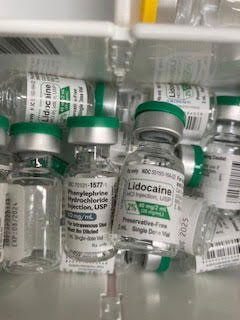 One morning, as I prepared for my first carotid case, I retrieved a 2 ml vial of lidocaine 2% from my Anesthesia Pyxis (an automatic medication dispenser) and administered it without incident. However, while getting ready for my second carotid case, I discovered a 1 ml vial of phenylephrine (10 mg) in container #22 amongst other 2 ml vials of lidocaine 2 %. Upon closer examination, I noticed three more vials of phenylephrine mixed with approximately 12 vials of 2 ml lidocaine 2% in the same container, all of which looked identical. I immediately contacted the in-house pharmacist, insisting that she come down to “document and retrieve” the misplaced vials of phenylephrine. I also notified the charge nurse and asked her to verify and ensure that every Pyxis was checked, confirming that container #22 did not contain phenylephrine. Administering phenylephrine (10 mg) intravenously to a patient would be tantamount to detonating a “bomb” and creating an unintentional disaster. As anesthesia professionals, we are responsible for properly checking and confirming the medication we administer. This mistake is easy to make out of muscle memory or poor lighting in the operating room, and we administer thousands of medications each year. I also filed a Patient Safety Report with our medical staff.
One morning, as I prepared for my first carotid case, I retrieved a 2 ml vial of lidocaine 2% from my Anesthesia Pyxis (an automatic medication dispenser) and administered it without incident. However, while getting ready for my second carotid case, I discovered a 1 ml vial of phenylephrine (10 mg) in container #22 amongst other 2 ml vials of lidocaine 2 %. Upon closer examination, I noticed three more vials of phenylephrine mixed with approximately 12 vials of 2 ml lidocaine 2% in the same container, all of which looked identical. I immediately contacted the in-house pharmacist, insisting that she come down to “document and retrieve” the misplaced vials of phenylephrine. I also notified the charge nurse and asked her to verify and ensure that every Pyxis was checked, confirming that container #22 did not contain phenylephrine. Administering phenylephrine (10 mg) intravenously to a patient would be tantamount to detonating a “bomb” and creating an unintentional disaster. As anesthesia professionals, we are responsible for properly checking and confirming the medication we administer. This mistake is easy to make out of muscle memory or poor lighting in the operating room, and we administer thousands of medications each year. I also filed a Patient Safety Report with our medical staff.
In a prospective observational study of 3,671 perioperative medication administrations, 193 (5.3%) were either a medical error or resulted in an adverse drug event1. In my case, a simple error of incorrectly stocking our Pyxis occurred because of packaging similarity. Fortunately, it was detected and not erroneously given to my patient. I hope this report serves as a reminder that we face ongoing challenges in our working environment that could endanger our patients. We must remain vigilant against our own errors as well as those of others.
Dr. Kong is an anesthesiologist at Sutter Roseville Medical Center.
He has no conflicts of interest.
REFERENCES
- Karen, CN, Patel, A et al. Evaluation of Perioperative Medication Errors and Adverse Drug Events. Anesthesiology. 2016; 124:25-34.

 Articles
Articles